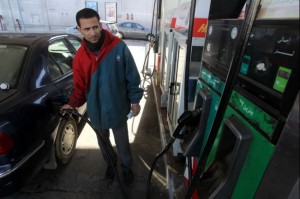
(AFP Photo)
By Mustafa Salih, Muhammad Adel, Ahmed Salaama, Islam Zayid Taqa
Petroleum Minister Sherif Hadarra made several statements regarding repeated postponements of the restructuring of Egypt’s fuel subsidies programme, particularly for diesel and other petroleum products. The statements specifically addressed the government’s new plan of limiting fuel rations to consumers.
This has come amongst speculation that implementation of this last step will be postponed until the commencement of Egypt’s parliamentary elections, due to the decrease in popularity of the Freedom and Justice party. Rampant increases in inflation in addition to repeated lapses in security have affected all sectors of society, as well as increased unemployment throughout Egypt, particularly in the country’s tourism sector, Hadarra said.
Officials from the Ministry of Petroleum discussed plans yesterday to implement the country’s new smart card programme for the distribution of petroleum products, set to take effect for diesel purchases in July and August for gasoline. Such a programme will be implemented by the electronic payment company E-Finance, and will reportedly not put minimum or maximum limits on the amount consumers can purchase.
Previously, the ministry had limited the monthly fuel consumption rates for individual vehicles to 150 litres of gasoline a month for personal vehicles, 900 litres for taxis, 1,800 litres of diesel for microbuses and pickup trucks, 3,000 litres for minivans, and 7,800 litres for full-sized buses.
Petroleum expert Ibrahim Zahran stated that the ministry’s failure to reduce spending on petroleum subsidies or implement a plan for rationing has prevented the government from being able to obtain reliable data regarding fuel use by individual consumers, at a time when elections for the House of Representatives are nearing, and the popularity of the Freedom and Justice Party is decreasing among the Egyptian public.
He further criticised the recent appointment of Hadarra as petroleum minister, saying that his selection was solely the result of his being a member of the Freedom and Justice Party.
Samir Azar, undersecretary of finance to the Ministry of Petroleum, stated that the implementation of Egypt’s smart card programme set to take effect at the beginning of July will seek to reign in smuggling and better regulate trade in petroleum products. Such a programme will inevitably cause a large amount of subsidies to be directed towards petroleum products.
Mahmoud Nazem, secretary for the Ministry of Petroleum, stated that he will soon host an all inclusive dialogue with all of the country’s political parties regarding petroleum rations distributed to citizens, taking into account the individual citizen’s consumption patterns.




